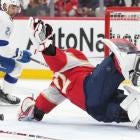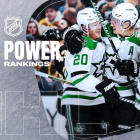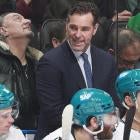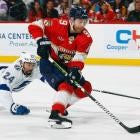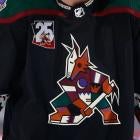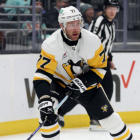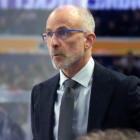When Zach Parise and Ryan Suter signed with the Minnesota Wild last week it was one of the biggest highlights in the 11-year history of the organization.
On Monday, Wild fans finally had an opportunity to see their newest players when the team officially introduced them at a press conference -- and both players already had the assistant captain "A" stitched on the front of their new sweaters.
"You don't make the type of commitment for these types of players unless you bring in two quality human beings," said Wild coach Mike Yeo. "What they do on the ice speaks for itself, but what they will add to our group from a leadership and character standpoint -- they're going to play a huge role for us, and we're expecting them to be leaders for a long time."
Excitement has to be at an all-time high around the team. They've already sold more than 2,000 new season-ticket packages since the signings were announced less than a week ago. With that sort of excitement -- and huge contracts, like the ones signed by Suter and Parise -- comes a lot of expectations, and it's probably best to keep those expectations within reason.
There is no doubt Minnesota is a better team right now with Suter and Parise than it was at the end of the 2011-12 season, when the team finished in 12th place in the Western Conference with 81 points, 14 back of the final playoff spot.
But how much better? And how much do they need to improve to qualify for the postseason for just the fourth time in franchise history, and the first time since 2007-08?
After the first 30 games last year the Wild were surprisingly the best team in the NHL with a 20-7-3 record on Dec. 10. At the time, there were serious questions (at least there should have been) as to how long they could keep up their winning ways given the way they were actually playing on the ice. They ended up winning just 15 of their remaining 52 games and missed the playoffs for a fourth straight year.
Even though they were coming out ahead on the scoreboard almost every night early in the year, they were getting outplayed in many key areas and consistently found themselves facing huge disadvantages on the shot/chance charts every night. Goaltending was carrying them almost entirely early on, and when Niklas Backstrom and Josh Harding were no longer able to do it by themselves every night, the season very quickly started to circle the drain.
Injuries helped play a role in their second-half collapse, but the biggest issue was an overall lack of impact talent on the roster. And that was true even before players started to go out of the lineup. Before the signings of Parise and Suter their best players were Mikko Koivu (one of the players lost due to injury through the season) and Dany Heatley, a declining star who is more of a 25-30 goal scorer (and a very expensive one) as opposed to the 40-50 goal scorer he was three or four years ago.
| 2012 NHL Free Agency | ||
|
||
| More NHL coverage | ||
The Wild have some intriguing young players coming up through their farm system, led by former first-round draft pick Mikael Granlund. But they still need more. Based on the conversation at Monday's press conference it sounds like there is a very good chance Parise will play next to Koivu, at least to start the season, as the veteran winger called Koivu "one of the best two-way centers in the NHL," and seemed to drop some hints in Yeo's direction.
That will certainly help what was the worst offense in the NHL last season, but will it be enough?
A team's goal differential is usually a good indicator for how strong a team is and where it will finish in the standings. Last season the Wild were outscored by 49 goals, the second-worst mark in the West. The only team that was outscored by more goals was the Columbus Blue Jackets.
Going back to the start of the 2001-02 season the average Western Conference playoff team (regardless of seed) has finished the regular season with a goal-differential of plus-25. To simply make the playoffs as a bottom seed teams have typically needed to finish with a mark of at least plus-10, so let's say the Wild have to reach that mark to just sneak in to the playoffs.
They would need a 59-goal improvement in just one year.
Is it possible? Of course it is. But it's not easy. Last season only one team in the entire NHL experienced that big of a jump, and that was the Ottawa Senators as they went from a minus-58 mark in 2010-11 all the way up to plus-9. They made the playoffs as the No. 8 seed in the Eastern Conference and lost in the first round.
The other biggest improvements this past season: The New Jersey Devils saw a 54-goal improvement on their way to the Stanley Cup Final. The Edmonton Oilers went from being absolutely terrible to just plain bad and improved by 49 goals (they were still outscored by 27 goals for the season), an improvement that was matched by the Colorado Avalanche.
So it's asking a lot, even with the addition of the two best free agents on the market. Especially in a conference as tough as the West. Los Angeles and Vancouver should be powers at the top of the conference, while Detroit, St. Louis, San Jose and Chicago look to be safe bets for the playoffs once again. Phoenix and Nashville look like they've taken some serious steps backward this summer (the latter thanks in large part to Minnesota signing Suter), especially if the Coyotes lose Shane Doan after losing Ray Whitney and Adrian Aucoin.
The signings of Suter and Parise made the Wild relevant this offseason for the first time in a long time. They're not yet Stanley Cup contenders, or even serious contenders in the Western Conference. But they're better. Simply making the playoffs should be a reasonable goal -- and perhaps even the ceiling -- for this team as currently constructed.
For more hockey news, rumors and analysis, follow @EyeOnHockey and @agretz on Twitter and like us on Facebook.
















